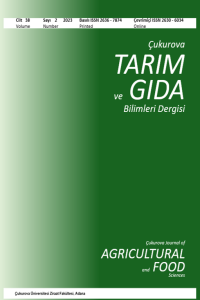Determination of the Susceptibility of Tomato Bacterial Speck Disease Agent Pseudomonas syringae pv. tomato to Different Copper-Containing Pesticides
Öz
The Bacterial Speck Disease, caused by Pseudomonas syringae pv. tomato (Pst), represents a significant bacterial ailment with a notable impact on tomato plants. This study aimed to ascertain the susceptibility levels of Pst isolates obtained from various fields in the Karataş district of Adana province, Turkey, when exposed to copper-containing pesticides under both in vitro and in vivo conditions. The results from in vitro efficacy experiments revealed that all isolates exhibited growth on nutrient media supplemented with 30, 60, and 90 μg/ml doses of copper sulphate. However, they failed to grow on media containing 120 and 150 μg/ml doses of copper sulphate, indicating the absence of resistance in the Karataş Pst isolates towards copper-based preparations. Furthermore, greenhouse-based in vivo pot trials revealed that the application of specific copper-based formulations (Copper+Mancozeb, Copper hydroxide, Copper sulfate, Copper oxychloride), as well as a commercial preparation containing 1% Harpin protein, resulted in varied degrees of inhibition in the incidence of Bacterial Speck Disease, with inhibition percentages ranging from 53.3% to 86.9%. The combined results of both in vitro and in vivo studies suggest that the pathogen did not develop resistance to the pesticides tested in the examined fields. The occurrence of the disease appears to be related to challenges faced by farmers in adhering to the recommended chemical dosage and application timing.
Anahtar Kelimeler
Tomato Pseudomonas syringae pv. tomato copper pesticide susceptibility resistance
Kaynakça
- Anonymous, (2022) Food Balances https://www.fao.org/faostat/en. Erişim tarihi: 12.01.2023
- Aysan, Y., Çınar, Ö. (2002) Tohum kökenli Pseudomonas syringae pv. tomato’ya karşı antagonistlerin etkisi. Türkiye V. Biyolojik Mücadele Kongresi. 4-7 Eylül, Erzurum.
- Aysan, Y., Mirik, M., Sahin, F., Çetinkaya-Yıldız, R. (2004) Outbreak of Bacterial Speck Disease in a Nursery in The Eastern Mediterranean Region of Turkey. 3 rd Balkan Symposium on Vegetables & Potatoes, 6-10 September, 2004, Bursa Turkey. Acta Horticulturae 729: 441-443.
- Aysan, Y., Saygılı, H., Şahin F. Çetinkaya-Yıldız, R. (2005) Present status of Bacterial Stem Rot on tomato in Turkey. Acta Hort. (ISHS) 695: 97-100.
- Basim H., Basim E., Yilmaz S., Dickstein E.R., Jones J.B. (2004) An outbreak of bacterial speck caused by Pseudomonas syringae pv. tomato on tomato transplants grown in commercial seedling companies located in the Western Mediterranean Region of Turkey. Plant Disease, 88 (9):1050.
- Bender, C.L., Cooksey, D.A. (1987) Molecular Cloning Of Copper Resistance Genes from Pseudomonas syringae pv. tomato. Journal of. Bacteriology. 169:470-474.
- Benlioğlu, K., Benlioğlu, S. (1998) Pseudomonas syringae pv. tomato’ya karşı bakır dayanıklılığı üzerinde araştırmalar. 8. Türkiye Fitopatoloji Kongresi.21-25 Eylül, Ankara.
- Bondarczuk, K., Piotrowska-Seget, Z. (2013) Molecular basis of active copper resistance mechanisms in Gram-negative bacteria. Cell Biology Toxicology (2013) 29:397–405.
- Bozkurt, İ.A., Soylu S. (2019) Elma kök uru hastalığı etmeni Rhizobium radiobacter’e karşı epifit ve endofit bakteri izolatlarının antagonistik potansiyellerinin belirlenmesi. Tekirdağ Ziraat Fakültesi Dergisi, 16: 348-361.
Adana'da Domatesten İzole Edilen Pseudomonas syringae pv. tomato İzolatlarının Bazı Bakırlı Pestisitlere Duyarlılıklarının Araştırılması
Öz
Pseudomonas syringae pv. tomato domates bitkisinde Bakteriyel Benek Hastalığına neden olan önemli bir bakteriyel etmendir. Bu çalışma kapsamında Adana ili, Karataş ilçesinde farklı tarladan izole edilen Pseudomonas syringae pv. tomato izolatlarının bakırlı prepapatlara duyarlılık düzeyi incelenmiştir. İzolatların 30, 60 ve 90 μg/ml dozlarında Bakır sülfat eklenen besi yerlerinde, gelişim gösterdiği, 120 ve 150 μg/ml doz içeren besi yerlerinde ise gelişemediği saptanmıştır. Bu durum Karataş izolatlarının bakıra direnç geliştirmediğini göstermektedir. Ayrıca cam serada yapılan saksı denemelerinde, bazı ticari bakırlı pestisit (Bakır sülfat, Bakır oksiklorür, Bakır+Mancozeb, Bakır hidroksit) ve Harpin proteini uygulamalarının Bakteriyel Benek Hastalığını %53.3-86.9 arasında değişen oranlarda baskıladığı belirlenmiştir. Her yıl bu tarlalarda hastalık görülme nedeni olarak üreticinin doğru zamanda ilaçlama yapamadığı fikri oluşmuştur.
Anahtar Kelimeler
Domates Pseudomonas tomato pv. tomato bakırlı pestisit duyarlılık
Kaynakça
- Anonymous, (2022) Food Balances https://www.fao.org/faostat/en. Erişim tarihi: 12.01.2023
- Aysan, Y., Çınar, Ö. (2002) Tohum kökenli Pseudomonas syringae pv. tomato’ya karşı antagonistlerin etkisi. Türkiye V. Biyolojik Mücadele Kongresi. 4-7 Eylül, Erzurum.
- Aysan, Y., Mirik, M., Sahin, F., Çetinkaya-Yıldız, R. (2004) Outbreak of Bacterial Speck Disease in a Nursery in The Eastern Mediterranean Region of Turkey. 3 rd Balkan Symposium on Vegetables & Potatoes, 6-10 September, 2004, Bursa Turkey. Acta Horticulturae 729: 441-443.
- Aysan, Y., Saygılı, H., Şahin F. Çetinkaya-Yıldız, R. (2005) Present status of Bacterial Stem Rot on tomato in Turkey. Acta Hort. (ISHS) 695: 97-100.
- Basim H., Basim E., Yilmaz S., Dickstein E.R., Jones J.B. (2004) An outbreak of bacterial speck caused by Pseudomonas syringae pv. tomato on tomato transplants grown in commercial seedling companies located in the Western Mediterranean Region of Turkey. Plant Disease, 88 (9):1050.
- Bender, C.L., Cooksey, D.A. (1987) Molecular Cloning Of Copper Resistance Genes from Pseudomonas syringae pv. tomato. Journal of. Bacteriology. 169:470-474.
- Benlioğlu, K., Benlioğlu, S. (1998) Pseudomonas syringae pv. tomato’ya karşı bakır dayanıklılığı üzerinde araştırmalar. 8. Türkiye Fitopatoloji Kongresi.21-25 Eylül, Ankara.
- Bondarczuk, K., Piotrowska-Seget, Z. (2013) Molecular basis of active copper resistance mechanisms in Gram-negative bacteria. Cell Biology Toxicology (2013) 29:397–405.
- Bozkurt, İ.A., Soylu S. (2019) Elma kök uru hastalığı etmeni Rhizobium radiobacter’e karşı epifit ve endofit bakteri izolatlarının antagonistik potansiyellerinin belirlenmesi. Tekirdağ Ziraat Fakültesi Dergisi, 16: 348-361.
Ayrıntılar
| Birincil Dil | Türkçe |
|---|---|
| Konular | Ziraat Mühendisliği |
| Bölüm | Araştırma Makalesi |
| Yazarlar | |
| Yayımlanma Tarihi | 29 Aralık 2023 |
| Yayımlandığı Sayı | Yıl 2023 Cilt: 38 Sayı: 2 |
Kaynak Göster
“Çukurova Üniversitesi Ziraat Fakültesi Dergisi” yayın hayatına 1 Ocak 2016 tarihi itibariyle “Çukurova Tarım ve Gıda Bilimleri Dergisi” adıyla devam etmektedir.






